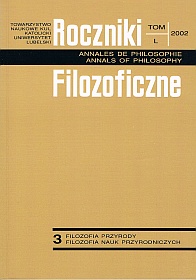Geneza teorii naukowych: uaktualniona forma kontrowersji o pluralizm metodologii
Abstrakt
The main topic of this paper is embraced by the post-positivistic criticism of the empiricist approach to the philosophy of science. A special stress on the pluralism of the (meta-)methodology is laid down. On the second level we have distinguished the following two main kinds of metascientific discourse: methodology of appraisal or evaluation vs methodology of invention or discvovery. In opposition to the traditional dichotomy of the well known two contexts we do not exclude some kind of relevance between these two sorts of metascientifc inquiry. Four groups of reasons being involved in an attempt to exclude therationalizability process of invention are then critically discussed. These four types of arguments against such a possibility of scientific heuristics (methodology of theory construction) appeal to 1)intuition, chance or unexplainability, 2) induction, 3) T-terms, and 4) predictability.
Previously to this critical analysis of the arguments some attention upon preparatory issues is given. Such a role play especially: the status of methodology, historical approaches to the methodology of theory construction and rational reconstruction of the context of invention.
Bibliografia
Danneberg L.: Methodologien. Struktur, Aufbau und Evaluation, Berlin: Duncker and Humblot 1989.
Hajduk Z.: Metanaukowe tendencje badawcze w problematyce odkrycia naukowego, „Roczniki Filozoficzne”, 33(1985), z. 3, s. 27-57.
Hajduk Z.: Metanaukowy walor tezy o niedookreśloności teorii przez dane doświadczenia: stanowisko L.Laudana, [w:] Filozoficzne i naukowo-przyrodnicze elementy obrazu świata, pod red. A. Latawiec [i in.], Warszawa: Wydawnictwo UKSW 2000, s. 149-170.
Pietruska-Madej E.: Odkrycie naukowe. Kontrowersje filozoficzne, Warszawa: PWN 1990.
Zamecki S.: Pojęcie odkrycia naukowego a historia dziedziny nauki, Wrocław: „Ossolineum” 1989.
Copyright (c) 2002 Roczniki Filozoficzne

Utwór dostępny jest na licencji Creative Commons Uznanie autorstwa – Użycie niekomercyjne – Bez utworów zależnych 4.0 Międzynarodowe.





